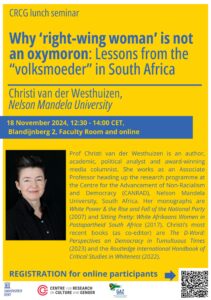
Why ‘right-wing woman’ is not an oxymoron: Lessons from the volksmoeder in South Africa
Christi van der Westhuizen
Centre for the Advancement of Non-Racialism and Democracy, Nelson Mandela University, South Africa
christivdw@mandela.ac.za
Abstract
Ethno-racial populisms currently surging across the globe have driven contestation over gender to a fever pitch. Women’s right to political agency and control over their bodies is under direct attack or being strictly circumscribed. Notably, right-wing women are firmly involved in intensified attempts to reverse the gains of successive waves of feminism. This presentation draws on historical research and interviews to make sense of how women come to advance or resist patriarchal politics. The rise and fall and (unexpected) rise of the Afrikaner nationalist volksmoeder (mother of the nation) in South Africa is illustrative of how women are mobilised and demobilised in the service of nationalisms. Afrikaner nationalist women were more publicly and politically active in the first half of the 20th century than the second half. They vigorously contributed to the version of Afrikaner identity that in 1948 tipped South Africa into the intensified form of colonialism known as apartheid but disappeared from public view after 1948. The volksmoeder assigned feminine care for the family and the volk to women. The flipside of its normalisation of ‘woman/wife-as-mother’ was to return Afrikaner women to the domestic realm with the demand of silence, service, and sexuality purposed for white reproduction, or ‘white sex’. After the transition to constitutional democracy in 1994, the volksmoeder imaginary is unexpectedly bolstered, receiving a revivalist injection from neoliberal and postfeminist versions of motherhood that coax women into an enclave form of nationalism.
Prof Christi van der Westhuizen is an author, academic, political analyst and award-winning media columnist. Her research interests are transdisciplinary, broadly focused on identity, difference, ideology and democracy in postcolonial contexts. She works as an Associate Professor heading up the research programme at the Centre for the Advancement of Non-Racialism and Democracy (CANRAD), Nelson Mandela University, South Africa. In 2022, she was a Visiting Professor at the Research Centre Global Dynamics at Leipzig University, Germany. Her monographs are:
- White Power & the Rise and Fall of the National Party(2007) and
- Sitting Pretty: White Afrikaans Women in Postapartheid South Africa(2017).
Christi’s most recent books (as co-editor) are titled The D-Word: Perspectives on Democracy in Tumultuous Times (2023) and the Routledge International Handbook of Critical Studies in Whiteness (2022). She has published in journals such as Africa Today, Comparativ, African Studies, Critical Philosophy of Race, and Matatu Journal for African Culture and Society. Her Doctorate in Sociology is from the University of Cape Town and she has held associateships with several universities. Christi’s media columns and analysis have featured in both South African and global news outlets.